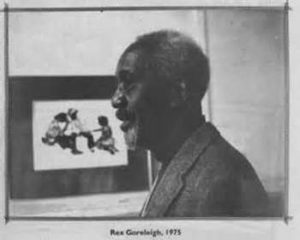
Rex Goreleigh
*On this date, in 1902, Rex Goreleigh was born. He was a Black artist (painter).
From Peullyn, Pennsylvania, Goreleigh became interested in art at an early age as images helped his communication overcome his shyness, which came from a childhood speech impediment. When he was fifteen, his mother died, and he left for Philadelphia. In 1918, he moved to Washington D. C., attending Dunbar High School for two years.
At eighteen, Goreleigh saw his first display of African American art in New York at the Harmon Foundation exhibition at International House. This show inspired him to take drawing lessons while he waited tables.
In 1933, while waiting at the table of Mexican muralist Diego Rivera, Goreleigh was invited to watch him work on the murals he was mounting at Rockefeller Center; this experience, he would later say, “put him on the road to becoming an artist.” In 1934, with the Works Project Administration (WPA), Goreleigh spent time with muralist Ben Shahn. For two years after this, he studied in Europe, returning to New York, teaching art at the Utopia House for the Federal Arts Project. From 1936 to ‘37, he taught at the Harlem Branch of the YMCA.
In the late 1930s, through the WPA, Goreleigh and artist Norman Lewis established an art center in Greensboro, N. C., after which he remained there, recently married to a local librarian. The couple moved to Chicago in 1940, and he worked as an art coordinator for the Schreiner-Bennet advertising agency. For three years until 1947, Goreleigh directed the Chicago Southside Community Art Center. He moved to Princeton, N.J., in the late 1940s and directed Princeton Group Arts from 1947 to 1953, a community arts center that provided lessons and organized concerts, lectures, and exhibits.
In 1955, he opened his Studio-on-the-Canal art school, which served the community into the 1970s. His best-known paintings are Dean’s Alley 1938, Tomato Pickers 1962, Misery 1940, Quaker Bridge Road 1967, and Sunflower 1967. Rex Goreleigh died in 1986.
Africana The Encyclopedia of the African and
African American Experience
Editors: Kwame Anthony Appiah and Henry Louis Gates Jr.
Copyright 1999
ISBN 0-465-0071-1